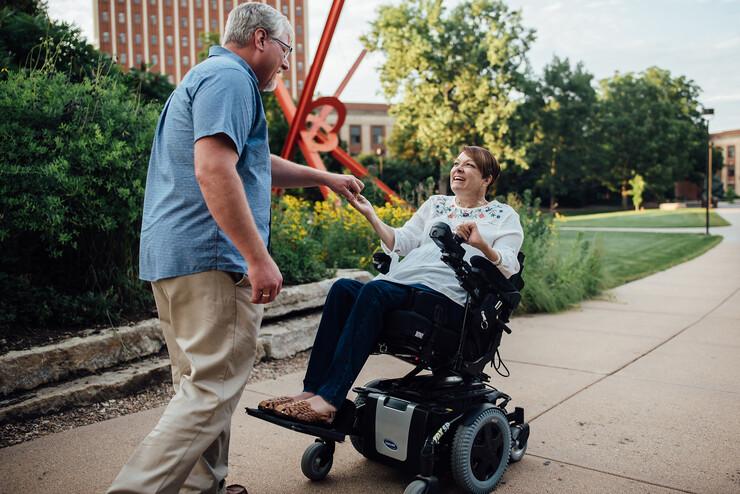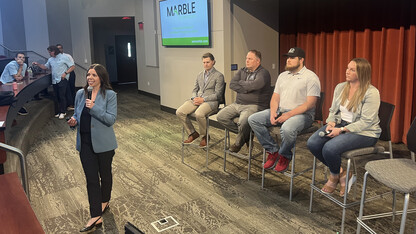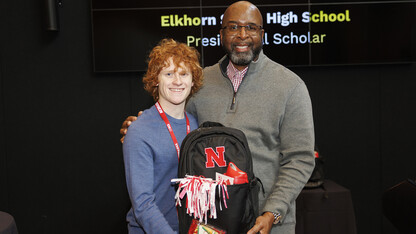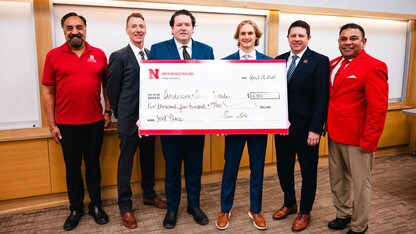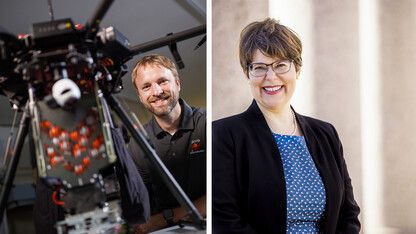· 6 min read
Flagel finds voice helping others at Nebraska U
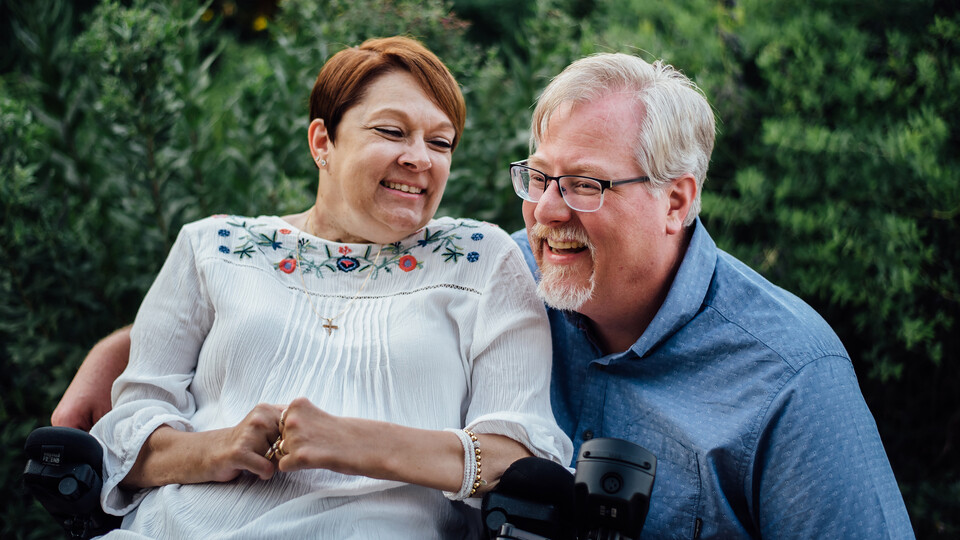
Jill Flagel had no reason to expect that a summer day spent swimming near her hometown of McCool Junction, Nebraska would change her life forever.
The 14-year-old and her family had visited the sand pits around the rural area dozens of times before. On this particular afternoon, however, Flagel dove into the water and woke up in the hospital. She sustained a spinal cord injury and was told she was largely paralyzed, requiring her to use a wheelchair as a C6-C7 quadriplegic.
Though her life changed in an instant, it didn’t change for the worse. Decades later, Flagel now serves as director of the University of Nebraska–Lincoln’s Faculty and Staff Disability Services office. She credits much of her success to the Americans with Disabilities Act, which was signed into law 30 years ago on July 26, 1990.
“I wouldn’t have a job if it wasn’t for the ADA. I may not have gotten the education that I have were it not for the ADA, and I certainly wouldn’t have the opportunity to travel and the things that I do with my family, my friends and my husband if it weren’t for the ADA,” Flagel said.
Finding a way forward
After being hospitalized for a year following her accident, Flagel returned home and graduated on time with her high school class. She then enrolled at the University of Nebraska–Lincoln in 1983, becoming the first in her family to attend college.
“I knew that without furthering my education, I probably couldn’t have a life that was very fulfilling,” Flagel said. “I wanted to be busy and I wanted to have a normal life, whatever ‘normal’ is. I thought that being in a wheelchair shouldn’t prevent that.”
At the time, Selleck Hall was the only wheelchair-accessible residence hall on campus. While university staff members were working to create better accommodations, the lack of any official guidance made going to class and having a normal social life a struggle.
“When I came to college, there were no laws saying that things had to be accessible. That were few door openers and elevators, and only one wheelchair-accessible dining hall and residence hall,” Flagel said. “Once I got to a building, I couldn’t necessarily always get in. Once I got inside, there wasn’t always a bathroom I could use.”
“We didn’t have a big voice back then. It was sort of that mentality of, ‘There aren’t that many people with disabilities, so what’s the big deal?’ It sounds terrible to say it like that, but that’s kind of how it felt.”
During Flagel’s time as a student, support began building for national disability rights legislation. The movement was led by Justin Dart Jr., a disability rights advocate who was once denied a teaching job for his use of a wheelchair. Flagel was able to testify about her experience and meet Dart in Omaha during his “Road to Freedom” tour, in which he visited all 50 states to speak with individuals who had been impacted by a lack of disability accommodations.
“We didn’t really know what we were asking for,” Flagel said. “We just wanted equality. We wanted to do the things that everybody wants to do — go to movies, concerts or whatever that might be.”
In 1990, two years after Flagel graduated from the University of Nebraska–Lincoln, the Americans with Disabilities Act was signed into law by President George H.W. Bush. The sweeping act banned discrimination and required accommodations for those with disabilities in nearly every corner of public life, including work, transportation and education.
“The ADA is a piece of civil rights legislation that everyone should pay attention to, because it can affect any individual at any given point in their life. At 14, I certainly didn’t think I was going to be in a wheelchair for the rest of my life,” Flagel said.
“There are also hundreds of thousands, millions really, of people with hidden disabilities. It could be anxiety or depression, or maybe a learning disability. You don’t see them, but they still have a disability and qualify for coverage under the ADA just like I would.”
Serving others
The passing of the ADA also gave Flagel a chance to build a career serving others like herself. She has worked at the University of Nebraska–Lincoln’s Faculty and Staff Disability Services office for 20 years, consulting with employees and their managers to find appropriate accommodations for their disabilities.
“I always say that I have the best job, because I get to help people keep their jobs,” Flagel said. “I just don’t know how it gets any better than that.”
Outside of work, Flagel has been an active volunteer with Disability Rights Nebraska, a statewide nonprofit that fights for the rights of individuals with disabilities and their families. Her friends, family and coworkers know her as a “talker,” and she has leveraged that outgoing personality to share her story at a number of disability rights events.
The 30th anniversary of the ADA holds deep meaning for Flagel — not just because it impacted her life in so many ways, but because she persevered and beat the odds to be around to see it happen.
“When I had my accident at 14, someone told me that people with disabilities like mine have a shorter lifespan, so I’d be lucky to hit 30. That stuck in my head for a long time,” Flagel said. “I just turned 55, and I’ve been married for 22 years. I’ve had a great life.”
“While having a disability is life-changing, it doesn’t have to be the end of your life. It may be a struggle, but it can also be a way forward.”


